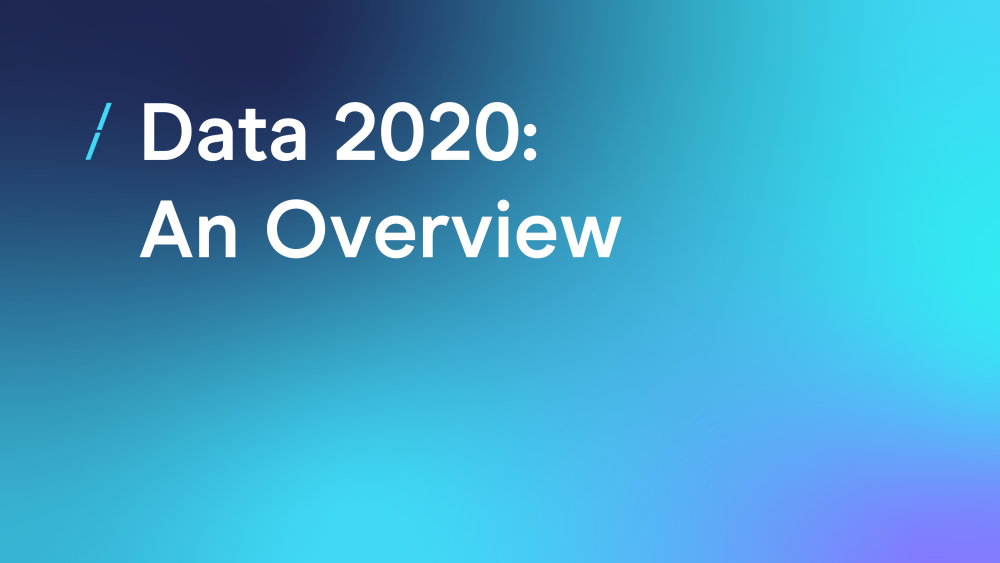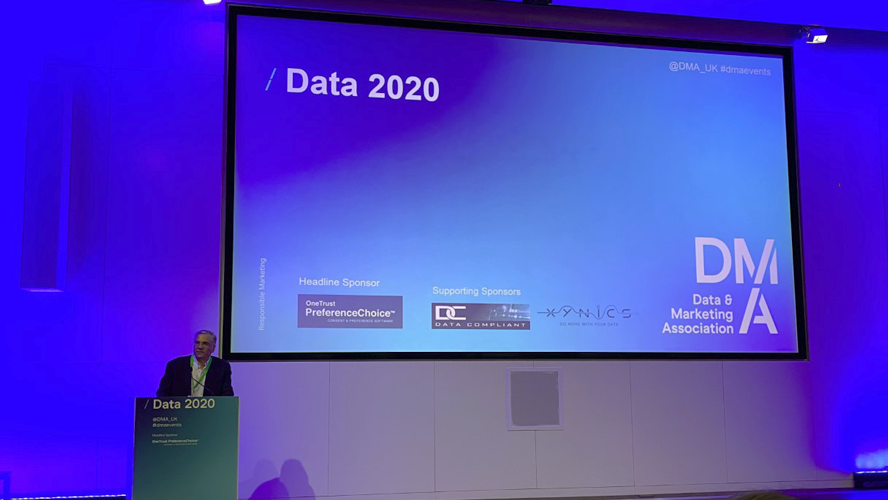Data 2020: An Overview
10 Mar 2020

DMA’s Data 2020 event took place on February 28 at Euston Square in London.
Our CEO Chris Combemale introduced the summit.
The day took the shape of an exploration of the responsible and respectful use of data; of how we can move beyond compliance to ethical frameworks; a close look at the impact of various legislative and regulatory issues; and most importantly, looking at examples of how brands can create compelling customer engagement powered by an intelligent marketing approach.
The UK in a Changing Europe
Anand Menon is Professor of European Politics and Foreign Affairs at King’s College London.
In his keynote he discussed the socio-economic dynamics behind the Brexit vote - one of the many ironies of which, he explained, is the almost perfect correlation between how strongly a region voted to leave the EU and how dependent its economy is on trade with the EU.
For example, the least dependent parts of the UK - Scotland and London - are the ones that voted most strongly to remain.
With the Conservative Party winning traditional Labour seats in areas of traditional manufacturing industry and with lower medium incomes than the average, Professor Menon offered this is now a Government that must hold dear to constituencies their Brexit deal could well hurt most.
The economic impacts of Brexit won’t come as a massive one-stop hit on January 1, but they’ll take place over the next five years, Professor Menon explained.
He closed with a couple of challenges: is it the case that people who voted Leave are aware that the economy will be damaged, but believe it a price worth paying? And can we really separate the economic gamble of Brexit from the political world in which it was conceived?
Time will, of course, tell.
Technology Policy and Innovation
ICO Executive Director Simon McDougall provided an update on the regulator’s recent ad tech work.
Institutions that people have put faith in are delivering but not for individuals, McDougall said.
He explained that, within the marketing and advertising communities, there’s now a greater acceptance this isn’t good enough and needs to change.
Responsible advertising, ethics, and making the data value exchange work for individuals have become thematic conversations, part of an inevitable movement.
These conversations will dramatically alter how we understand our relationships with individuals, the way we market and communicate with them, and our approach to linking various corporations and markets to different people.
Organisations are deeply concerned about why their consumers, users and citizens don’t trust them. Privacy can help us be part of that trust conversation, he explained.
The metric shouldn’t simply be training all employees in data protection or completing GPIOs, but rather making sure people feel comfortable with us using their data in innovative ways.
McDougall said work has progressed with both IB group associations and Google, before reflecting that, while getting an industry to change without taking regulatory action remains the plan, considerations are being made if enforcement is required.
For more information and ICO insight, head to Simon McDougall’s blog.

The Six-Step Ad Tech Challenge
Julia Porter, Board Member of the Data Protection Network, talked about how education is crucial in ad tech.
Accountability is a key principle in GDPR: marketers and advertisers need to make sure they understand how data is being processed and create transparency for their customers.
-
What data is being used?
-
When is it being used?
-
Where does it get sent?
-
How can you enforce contracts?
-
What happens to data when it leaves your place and moves on to the next supplier?
In the end, Porter explained, we must take ownership of our relationship with ad tech providers; they’re not somebody else’s concern. Data used in the wrong way, particularly special category data that reveals personal information, can cause harm.
There’s no question that DPIAs must be part of the framework of our activities, she continued.
“Where a type of processing is likely to result in a high risk to the rights and freedoms of persons, you should do a DPIA.”
Porter encourages consulting with the ICO, who can help build these CPOs, making them relevant and meaningful to the organisation.
The Six-Step Ad Tech Challenge:
-
Education
-
Understand the data journey
-
Special category data
-
Carry out a DPIA?
-
Audit supply chain
-
Evaluate ROI of opportunities
Getting to Grips with Cookie Compliance
Cookies are simple processes of memory ubiquitous in today’s world.
Fedelma Good, Director of PwC, examined the difference between first-party and third-party cookies as well as the evolution of e-privacy laws. The most important thing, Good said, is that we understand the laws that apply.
Cookie law is a misnomer: it’s actually about technologies that perform a function like cookies. If you need anything from or write anything to a user’s device, consent is needed.
Two laws to remember, she said, are the E–Privacy Directive and the GDPR.
Cookies are now on people’s agenda not only because of ad tech, but because GDPR has brought in a higher level of consent. How cookies were being implemented and the types of consents being used weren’t – aren’t – sufficient.
Cookie law doesn’t only apply when personal data is concerned, she explained.
The issue is reading from and writing to the device; non-personal data applies as well. Adopting your cookie compliance approach in a way that reflects your brand is an important choice.
The presentation of a requirement to accept cookies to continue to a website remains open to debate. “What we have is the emergence of legitimate interest as a basis for evaluation,” Good concluded.
Privacy by Design
Legal expert and certified compliance and ethics professional Robert Bond led a panel made up of the three finalists for the Rosemary Smith Award, along with OneTrust sponsor Joe Porter.
Panellists tackled questions about privacy by design, challenging the idea that as we create technologies, we usually build in privacy as an afterthought.
If we’re going to maintain, build and keep trust, Bond said, then privacy needs to be implemented at the start, not retrofitted at the end.
Privacy was talked about as a competitive differentiator and an advantage for an organisation.
Kristof Ruisz, Privacy Advisor at Emirates, described it as an overall compliance approach, emphasizing the importance of putting yourself in the shoes of the individual you’re marketing to.
When asked how she got engagement from the top and bottom, Paula Welsh, Head of Quality and Governance, said Keech Hospice Care implemented a cross organisational working room.
The space gave individuals a chance to take part in general and tailored training.
Scott Joslin, Senior Vice President at WarnerMedia, reminded us privacy isn’t an IT solution. It requires all stakeholders to come to the table.
Bond wrapped up the session by saying GDPR is a massive exercise, but it shouldn’t be a tick-box exercise – it should be living and breathing.
The Dynamic Blood Appointment
The session featured DMA Awards 2019 Gold Winners Tom Aggett, Marketing Manager, NHS Blood and Transplant, Tristan Cavanagh, Creative Director, 23red and Jonathan Acton, Head of Creative Delivery, Clear Channel.
Aggett, Cavanagh and Acton discussed their Dynamic Blood Appointment Campaign, which encouraged people who’ve never given blood before to visit their local donor centre.
Every day NHSBT needs 5,000 people to give blood, but barriers prevent lots of individuals from doing so, including inconvenience and thinking people like them aren’t donating or their blood isn’t needed.
The campaign tried to change this perception.
Using data sites and digital screens, it targeted people living near static zone centres. To create an emotional connection, genuine recipients of blood donation were photographed.
The wide range of cases and stories helped highlight the many different reasons for why people need blood.
Four pieces of data were used in all sites and highly localised:
-
Number of available appointments that day
-
Appointments booked that day
-
Available appointments in a week
-
Number of first-time blood donors that week
The campaign ran for three weeks across ten UK cities and was largely successful.
Compared to a similar period with no marketing activity, it generated a 55% increase in registrations, and a 23% increase in registrations post campaign.
Find your nearest blood donor centre here.
Data as a Force for Good
Rachel Aldighieri, Managing Director of DMA, led a panel on tackling ethical challenges to create people-focussed technology. Panellists included:
-
Dean Russell, MP for Watford
-
Olivia Gambelin, Founder and CEO, Ethical Intelligence
-
Ben Lyons, Head of Online Targeting, Data Ethics and Innovation
-
Firs Khnaisser, Head of Decisioning, Standard Life
The experts explored:
-
Ethical challenges coming through for businesses, especially when using AI in data-driven technology
-
What do we mean by data ethics and how should businesses approach this?
-
How can we prove when we talk about the value of data, we’re talking a lot about the value of values?
-
Can regulation actually stay relevant and ahead of the curb when technology is moving so quickly?
-
Thinking of ethics as a driver for innovation
-
How can Google/Facebook/Amazon, etc. encourage to be transparent to individuals and government and meet high ethical standards? Can they lead the way?
To finish, each panellist gave one tip for practical starts that organisations can take in terms of driving ethical approach:
-
Gambelin: start setting up strategy
-
Khnaisser: remember technology is here to serve us, not the other way around
-
Lyons: think about the opportunities and risks for the organisation/sector and how we can use data responsibly
-
Russell: do a check on how it feels. Would you feel comfortable?
Closing remarks from DMA’s CEO Chris Combemale wrapped up the morning session before the day broke up for intimate roundtable sessions.
A huge thank you to our speakers and sponsors and partners, and we hope to see you all at next year's summit.
For more from our Responsible Marketing Campaign click here.
Please login to comment.
Comments